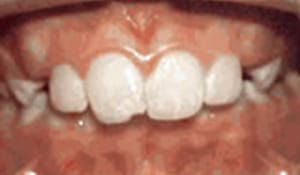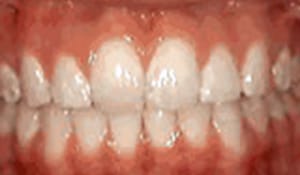Home - All About Braces - How to Know If You Need Braces - Overjet or “Buck Teeth”

Erick practices orthodontics in our Riverton Oral Health office.
Overjet: Protruding Front Teeth
What It Means When Front Teeth Stick Out—and How Orthodontics Can Help.


Overjet refers to the horizontal distance between the upper and lower front teeth. When the top teeth protrude significantly past the bottom teeth, it’s sometimes called “buck teeth” — though the clinical term is overjet.
While a slight overjet is normal, an excessive overjet can affect the bite, jaw alignment, and even self-esteem — especially in older kids and teens.
What Causes an Overjet?
- Genetics and jaw growth imbalance
- Thumb sucking or prolonged pacifier use
- Tongue thrusting or mouth breathing
- Early loss of baby teeth
- Delayed eruption or positioning of adult teeth
Signs of an Overjet
- Upper front teeth that visibly stick out in front of the lower teeth
- Difficulty closing the lips over the front teeth
- Speech issues like lisps
- Increased risk of trauma to the front teeth (especially during sports)
- Mouth breathing or jaw strain
Why Treatment May Be Recommended
- Improper bite and chewing function
- Excessive wear on back teeth
- Increased risk of dental injuries
- Jaw joint pain or TMJ symptoms
- Difficulty with lip closure or resting posture
How Is Overjet Treated?
- Braces with elastics to bring teeth and jaws into alignment
- Growth-guided appliances like headgear or functional devices
- Clear aligners (like Invisalign®) in appropriate cases
- Tooth extraction (in rare cases of severe crowding)
- Jaw surgery (for extreme skeletal overjet in non-growing patients)
When to Schedule a Consultation
If your child’s front teeth seem to stick out noticeably—or if they have trouble closing their lips, biting, or speaking—it may be time for an orthodontic consultation.
At Families First, we offer complimentary consultations that include imaging and personalized treatment recommendations. Our orthodontic team is here to help you understand your child’s bite and create a plan for a balanced, confident smile.
Claim Your Complimentary Consultation
Our orthodontic team is here to help with complimentary orthodontic consultations in Bluffdale, Riverton, Stansbury Park, and West Jordan.
Complete the form below or call (801) 254-9700 to schedule.
Frequently Asked Questions
What’s the difference between an overjet and an overbite?
An overjet is when the top teeth stick out forward; an overbite is how far they vertically overlap the lower teeth. Some patients have both.
Can an overjet fix itself as my child grows?
Unlikely. Overjets usually persist or worsen without orthodontic intervention.
Are braces or aligners better for an overjet?
Both can be effective — it depends on the age of the patient, jaw development, and severity. An orthodontist can recommend the best option.
Is an overjet just a cosmetic issue?
No — overjets can affect speech, jaw comfort, and increase the risk of injury to the front teeth.
At what age should an overjet be treated?
Evaluation around age 7 is ideal. If treatment is needed, early intervention may prevent more complex issues later.